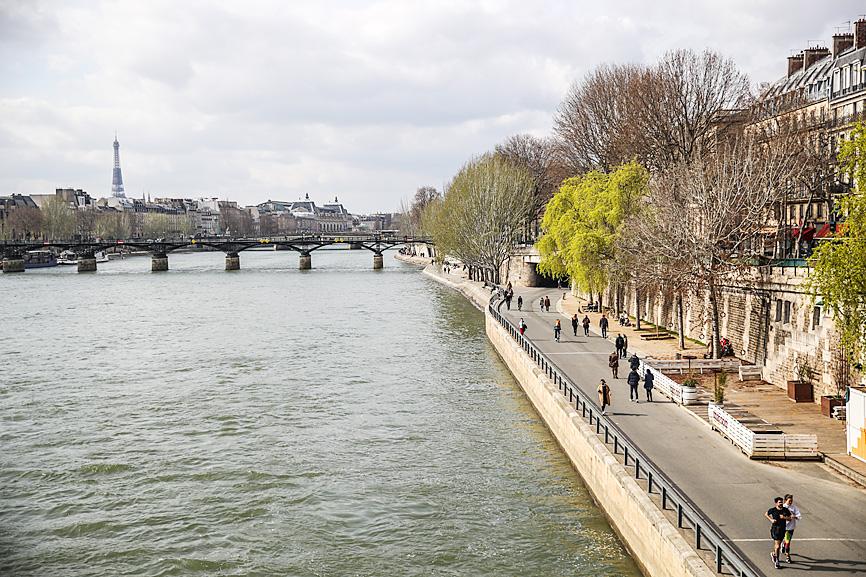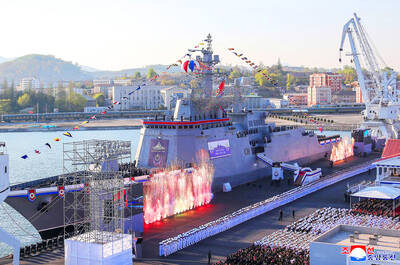France, Belgium and Poland on Saturday tightened curbs as COVID-19 cases surged in Europe, while Chile confined more than 80 percent of its population.
France said the situation is “critical” and added three more departments to the 16 already under tight restrictions.
Twenty million people in France, including the greater Paris region, are classed as living in high-infection zones.

Photo: EPA-EFE
They are not allowed to travel further than 10km from home without an essential reason.
Daily cases in France have nearly doubled since the start of this month and there have been more than 200,000 new cases every week.
However, that did not stop a crowd turning out for an outdoor protest concert on Saturday evening in central Paris.
Numbers in France’s intensive-care wards are close to record highs in November last year and still climbing.
In stark contrast, across the Channel people were relishing the prospect of a pint and a haircut as British Prime Minister Boris Johnson vowed to stick to his plan to unwind anti-COVID-19 measures.
Johnson said his government’s successful mass vaccination drive and pro-business policies would hasten economic recovery, “jab by jab, job by job.”
“In just a few days’ time, I’m finally going to be able to go to the barbers,” the mop-haired Johnson added.
Wales on Saturday became the first UK nation to lift travel restrictions.
From today, England’s stay-at-home order would be relaxed, allowing groups of up to six people to meet outside.
The government plans to allow outdoors drinking in pub gardens, and non-essential retail, such as hairdressers, from April 12.
On Saturday, music fans in Barcelona, Spain hugged, danced and sang along at a sold-out rock concert after taking rapid COVID-19 tests in a trial that could revive the live-music industry in Spain and beyond.
About 5,000 fans at the show for Spanish indie band Love of Lesbian had to wear masks, but social distancing was not required in the Palau Sant Jordi arena.
“It was spectacular. We felt safe at all times. We were in the front row and it was something we’d missed a lot,” publicist Salvador, 29, said after the show. “We are very proud to have had the chance to take part in this. We hope it’ll be the first of many.”
Meanwhile Belgium closed all businesses involving non-medical physical contact from Saturday. Shops offering “non-essential” services can only receive clients with appointments.
Poland shuttered creches, playgrounds, furniture and DIY stores, as well as beauty salons and barber shops.
Social distancing in churches in the predominantly Catholic nation has also been tightened, with one person allowed in every 20m2 instead of 15m2 earlier.
Chile also started a new and strict lockdown for more than 80 percent of its population, with shopping trips for even basic products banned during weekends.
The COVID-19 pandemic has killed more than 2.7 million people since December 2019, according to an Agence France-Presse tally on Saturday.
Health officials have rolled out more than 510 million COVID-19 vaccine doses around the world, but with big gaps between countries.
The WHO on Friday appealed to richer nations to donate vaccines to help poorer ones start inoculations.
The deployment of vaccines has been glaringly unequal, with the US accounting for more than one-quarter of the global total and poorer nations lagging far behind wealthier ones.
Kenya on Friday became the latest African country to order a partial lockdown, shutting schools and bars in and around the capital, Nairobi.

Archeologists in Peru on Thursday said they found the 5,000-year-old remains of a noblewoman at the sacred city of Caral, revealing the important role played by women in the oldest center of civilization in the Americas. “What has been discovered corresponds to a woman who apparently had elevated status, an elite woman,” archeologist David Palomino said. The mummy was found in Aspero, a sacred site within the city of Caral that was a garbage dump for more than 30 years until becoming an archeological site in the 1990s. Palomino said the carefully preserved remains, dating to 3,000BC, contained skin, part of the

TRUMP EFFECT: The win capped one of the most dramatic turnarounds in Canadian political history after the Conservatives had led the Liberals by more than 20 points Canadian Prime Minister Mark Carney yesterday pledged to win US President Donald Trump’s trade war after winning Canada’s election and leading his Liberal Party to another term in power. Following a campaign dominated by Trump’s tariffs and annexation threats, Carney promised to chart “a new path forward” in a world “fundamentally changed” by a US that is newly hostile to free trade. “We are over the shock of the American betrayal, but we should never forget the lessons,” said Carney, who led the central banks of Canada and the UK before entering politics earlier this year. “We will win this trade war and

‘BODIES EVERYWHERE’: The incident occurred at a Filipino festival celebrating an anti-colonial leader, with the driver described as a ‘lone suspect’ known to police Canadian police arrested a man on Saturday after a car plowed into a street party in the western Canadian city of Vancouver, killing a number of people. Authorities said the incident happened shortly after 8pm in Vancouver’s Sunset on Fraser neighborhood as members of the Filipino community gathered to celebrate Lapu Lapu Day. The festival, which commemorates a Filipino anti-colonial leader from the 16th century, falls this year on the weekend before Canada’s election. A 30-year-old local man was arrested at the scene, Vancouver police wrote on X. The driver was a “lone suspect” known to police, a police spokesperson told journalists at the

North Korean leader Kim Jong-un has unveiled a new naval destroyer, claiming it as a significant advancement toward his goal of expanding the operational range and preemptive strike capabilities of his nuclear-armed military, state media said yesterday. North Korea’s state-run Korean Central News Agency (KCNA) said Kim attended the launching ceremony for the 5,000-tonne warship on Friday at the western port of Nampo. Kim framed the arms buildup as a response to perceived threats from the US and its allies in Asia, who have been expanding joint military exercises amid rising tensions over the North’s nuclear program. He added that the acquisition